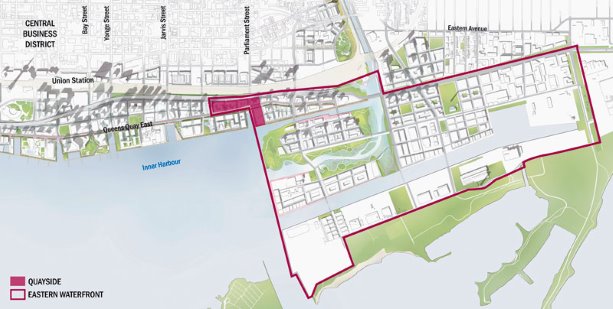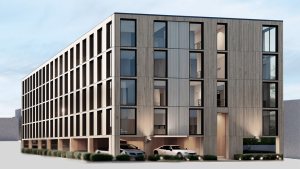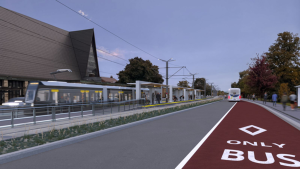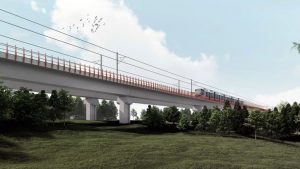Waterfront Toronto has issued a Request for Proposals (RFP) for the development of its 12-acre Quayside site that will require the construction sector and other participants to stretch boundaries of innovation in multiple dimensions including cleantech, building materials, inclusive communities and procurement partnerships.
The statement accompanying the RFP outlines a development plan that will require the new partner to pre-plan for a "globally significant demonstration project that advances a new market model for climate-positive urban developments."
Waterfront Toronto will remain integrally involved in the project once the RFP process is complete, said the agency’s president and CEO Will Fleissig. He anticipates the development will attract attention on a global scale.
"We can now take bigger ideas and aspirations and say, we don’t really know what the most innovative and best building technology might be, let’s get the private sector involved earlier, let’s think it through together, and then, once we have a business plan and some ways that we think might work, then we can bring on engineers and developers and designers who can then come in and say, ‘ah, here’s a way to make that vision happen,’" said Fleissig.
A Waterfront Toronto statement described the RFP as calling for a proposal that achieves "ambitious, high-level objectives" such as sustainability, resiliency and urban innovations that include technology advancements to meet carbon emission reduction targets; complete communities with a range of housing types for families of all sizes and income levels; and economic development that provides a "testbed for Canada’s cleantech, building materials and broader innovation-driven sectors."
Will Fleissig
Waterfront Toronto
Fleissig said non-traditional development partners such as technology firms, non-profits and academia will be invited to join with traditional partners such as pension funds and private developers in furthering the vision. As for the construction sector, Fleissig said he has been bombarded with interest from contractors and suppliers looking to take the next steps using new techniques and materials.
"I have gotten so many great responses from the main commercial builders that are currently building throughout the GTHA (Greater Toronto and Hamilton Area), coming to me and saying, ‘how do we get engaged, we want to learn new ways, how we build, how we operate, how we look at energy, how we form new partnerships,’" said Fleisseg. "Everyone is so hungry to dive in and to help out.
"I can’t wait for the meetings," he said. "I am actually a licensed architect, that is where I started my career, I love construction, and I can’t wait to get the concrete industry and the wood industry and the energy folks, the renewable people in a room and say, what are some new materials, what are some new building technologies, what are some ways we can test some of these ideas."
The Quayside site consists of three blocks of land located at the east end of Queens Quay in downtown Toronto near the waterfront. The land is publicly owned through Waterfront Toronto and the City of Toronto. The RFP was issued March 17.
"What we are looking for is a partner who for themselves may have done something like this, a demonstration project," said Fleissig. "Or may have some technologies they may want to try out, and put their seed capital into it, or that are thinking about electricity and the grid and carbon, for their own business reasons, and would like to try something and see what works."
Waterfront Toronto speaks of Quayside as a pilot project, in that lessons learned will contribute to a template for development of the 800-acre Port Lands site.
"The context is this is the beginning of a much larger revitalization project," the CEO said.
Fleissig — whose name translated from German means "industrious" or "diligent" — joined Waterfront Toronto in January 2016 after a varied career that included urban development in San Francisco, Boston and Boulder, Colo. Since then, he has spearheaded city-building consultations with such players as the Ontario Centres for Excellence, the Canada Green Building Council, Mars, the proponents behind the private-sector Carbon Impact Initiative Action Plan launched by EllisDon and federal and provincial partners.
"We’ve been in discussion with Ottawa and the folks who are exploring the infrastructure bank and with (Finance) Minister Bill Morneau’s office and (Infrastructure) Minister Amarjeet Sohi’s office so we are pretty aware of what they are trying to do in terms of creating new jobs and trying to support green technology here in Canada and trying to look at new approaches with social infrastructure," said Fleissig.
"That is what is amazing about this project, this ticks every one of those boxes that the prime minister and minister Morneau and minister Sohi talk about."
Spotlight on suppliers
TORONTO — Waterfront Toronto president and CEO Will Fleissig says with word circulating that the agency wants to innovate with green building materials and cleantech in upcoming projects, solicitations have come from all sources, from high-level meetings to offhand discussions at conferences and elsewhere.
For example, he said, he has spoken to glass manufacturers who produce panes that react to light intensity and solar power developers who produce panels that create energy when laid on parking spaces to be driven over.
One Canadian startup has invented the Nanoleaf, a lightbulb that is touted to be the least carbon emitting in the world, he said.
"If you give these guys an opportunity to partner with an Ericson or a Philips or a GE, and let them actually get a demonstration project, they would learn, they would get their production going, and then if we are successful, they can go to the world market," said Fleissig.








Recent Comments
comments for this post are closed